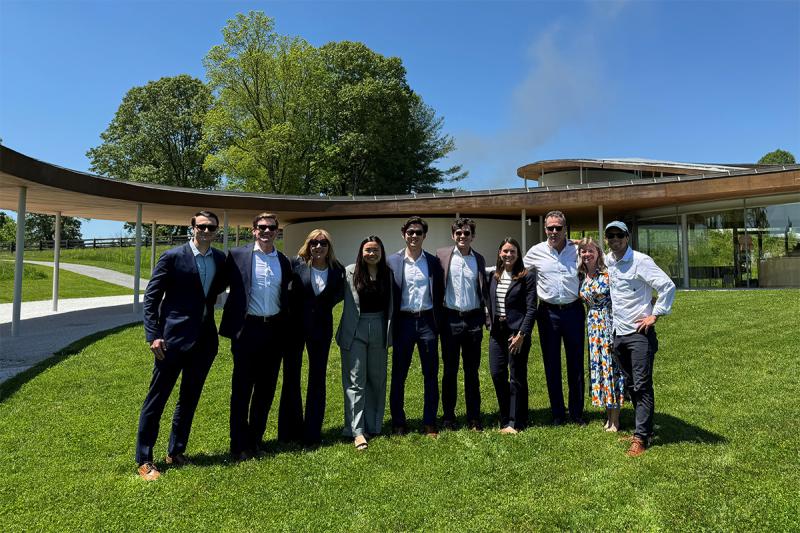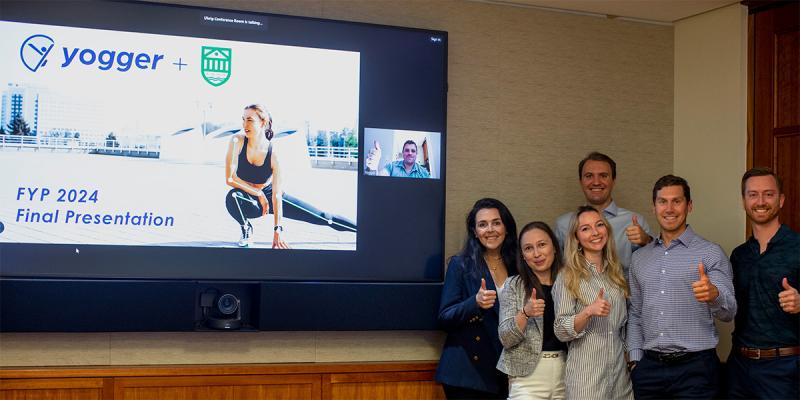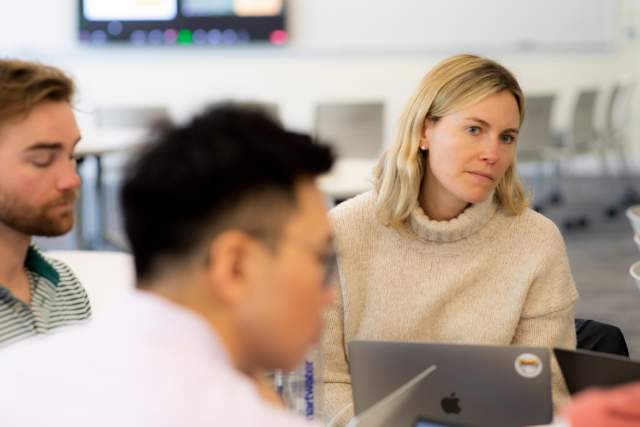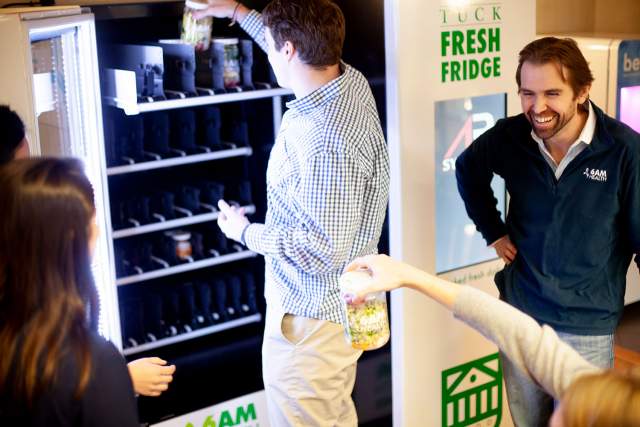The required First-Year Project (FYP) course presents an ideal opportunity for future MBAs to hone developing skills, discover a new industry, or even launch their first startup.
T’25s assembled 59 discrete FYP teams this past spring. Eleven pursued entrepreneurial First-Year Projects (eFYPs) and 48 were completed for business clients, representing a range of industries and geographies. Among them were local nonprofits, an alumni-founded startup, and a UK-based designer and manufacturer of AI-powered humanoid robots.
“There are no limits to the types of businesses students choose to work with or to the problems FYP teams are working to solve,” says Executive Director of the FYP Becky Rice-Mesec. “The course evolves each year to meet the changing business needs of our clients, but students are always contributing meaningful work that has an immediate impact on these organizations.”
Here’s a closer look at three FYPs from the 2024 academic year:

Grace Farms Foundation
Karen Kariuki T’08 counts her own FYP as one of the most transformative learning experiences she had at Tuck. Her team worked with General Mills on a strategy project, exploring how the company could engage nonprofits in developing countries to address food insecurity.
The experience inspired her post-MBA career path, a continued exploration of how business and philanthropy can work together to create social impact.
As Managing Director, Strategic Initiatives and Investor Engagement for the nonprofit Grace Farms Foundation, it is no wonder then that Kariuki tapped an FYP team to help the organization strategize ways to advance Design for Freedom—the movement to eliminate forced labor in the building materials supply chain.
“The FYP partnership was an easy decision,” says Kariuki. “Tuck students have incredible resources at their disposal. They bring valuable expertise and perspective, and they understand how to use an interdisciplinary approach to address complex challenges.”
Kariuki also knew the FYP team would bring to bear their diverse backgrounds in areas like finance, consulting, marketing, and retail.
“Leveraging that experience is critical since Design for Freedom follows the change we’ve seen in fashion and food with a movement toward more ethical production and use of those products,” says Kariuki. “We’re adopting that same approach to examine the systems that create shelter.”
It is the epitome of a big and complex problem and the most significant challenge for the Tuck FYP team early on was determining where they could add the most value.
Tuck is built on this foundation of trust and respect, not in relation to how many years you’ve been in the workforce, but instead, how curious you are. That level of curiosity showed up in profound ways for this team. They were incredibly impressive.
— Karen Kariuki T’08, Managing Director, Strategic Initiatives and Investor Engagement, Grace Farms Foundation
They learned about a recently launched company, Grace Farms Tea & Coffee, offering ethically sourced, fair-trade certified teas and coffees, with all profits reinvested to support Design for Freedom.
“We saw a lot of opportunity with the tea and coffee business,” says FYP team member Kenlynn Yeo T’25, who previously worked in e-commerce. “We were excited to dig in and think about ways to grow the business, which was in a pretty nascent stage.”
The team sat down in Feldberg Library and poured over consumer and market reports that provided year-by-year breakdowns of the tea and coffee industry, based on thousands of survey results.
“This research helped us identify what consumers were drinking and also pinpoint some key market trends,” explains teammate Cillian Connor T’25. “One of the biggest insights we found was the growth of ‘ready to drink’ products that you can easily grab and take with you.”
For Grace Farms Tea & Coffee, which maintains several corporate sponsorships, the idea of simplifying purchasing decisions for busy professionals made sense.
Beyond the well-vetted, data-informed advice the team shared, Kariuki was equally impressed with the group’s enthusiasm to dive into a unique project.
“Tuck is built on this foundation of trust and respect, not in relation to how many years you’ve been in the workforce, but instead, how curious you are,” says Kariuki. “That level of curiosity showed up in profound ways for this team. They were incredibly impressive.”

Yogger
As the name implies, participation in the FYP is typically limited to a student’s first year at Tuck.
But for Adrian Heneveld T’24, cofounder of the movement analysis startup Yogger, experiencing the FYP in consecutive years as both a student and a client was an opportunity too good to pass up.
Yogger’s mobile app eliminates the need for costly sensors and lab equipment, giving physical therapists, coaches, and individuals the ability to measure movement progress using real-time tracking and data metrics.
The first version of the app went live on the App Store just as Heneveld began his MBA. During his first year, he assembled an FYP team to establish a roadmap for both the product and the business.
“On the business side, my co-founder and I were trying to figure out how we wanted to grow,” recalls Heneveld. “We knew about the traditional path of raising venture capital and pursuing fast growth, which felt kind of boom or bust, so we wanted to explore other paths that might require less outside investment.”
The product roadmap helped Heneveld determine the design and product features that were needed for different end users. After conducting dozens of customer interviews, they also came to an important realization.
“When we started the FYP, we thought of ourselves as a digital health app, but our research helped us realize that we were a sports-focused product,” says Heneveld. “As a result, we were able to narrow our focus and I don’t think we would have gotten there as quickly without the help of my team.”
Given how valuable the experience was for Heneveld and his company, he decided to work with an FYP team again this past year—this time as a client.
Once again, the FYP had two project streams, with one focused on pricing and the other on building out the go-to-market (GTM) plan for Yogger’s planned B2B sales motion.
Getting a detailed, inside look at how an early-stage company operates was incredibly valuable for Christina Helm T’25, who plans to move into venture capital after Tuck.
Helm worked alongside FYP teammate Paige Keating T’25 on the GTM workstream. Quickly learning the ins and outs of the Hubspot platform, Helm and Keating built several call and email sequences as well as daily reporting dashboards to track outreach efforts.
It was motivating to know we were building systems that would be implemented right away. By the end of the project, we all felt fully invested in Yogger’s success.
— FYP Team Member Christina Helm T’25
Knowing their hard work would immediately be put to use by a group of summer interns made the project even more fulfilling for the team.
“It was motivating to know we were building systems that would be implemented right away,” says Helm. “By the end of the project, we all felt fully invested in Yogger’s success.”
The progress made during the FYP has put the company on a path toward faster growth than Heneveld ever expected.
“We’re at a place now where we’re having a hard time keeping up with the response that we’re getting from the product,” he says. “So, we know that we need to grow and pursue the funding needed to build out our team.”
Asked if he envisions continuing his engagement with the FYP in the future, Heneveld is quick to respond.
“Absolutely. One of the most important things I learned at Tuck is that anytime you can surround yourself with talented people to help you solve a problem, you jump at the chance,” says Heneveld. “Working with the FYP team has been fun and has accelerated our progress in a lot of ways.”
Engineered Arts
Willian Bezerra T’25 had three potential topics in mind for his FYP—industrial automation, robotics, and energy.
With a background in industrial engineering and robotics, he had been following Engineered Arts, a UK-based designer and manufacturer of AI-powered humanoid robots for some time.
He reached out to Engineered Arts CEO Will Jackson directly to see if an FYP partnership was possible.
Jackson responded and introduced Bezerra to Naomi Hart, an AI Persona Architect for the company which had recently entered the U.S. market. Before long, the pair discussed the outlines of a project focused on market research and strategy.
“I wanted to source a project that aligned with my interests and that also presented a real challenge and growth opportunity for me and my team,” says Bezerra. “For those reasons and more, the FYP with Engineered Arts was the perfect fit.”
Bezerra had no trouble filling out his FYP team with several classmates jumping at the chance to contribute to a first-of-its-kind project. Jonathan Goldstein T’25 brought deep experience in advertising and marketing, while John Kim T’25 supplied managerial and organizational expertise. Yixuan Su T’25 and Zhenyu Sun T’25 rounded out the team, leveraging their respective backgrounds in finance and consulting.
Hart was impressed by the enthusiasm and intellectual courage the group showed in bringing fresh perspectives to an incredibly niche market.
“There’s no historical data about commercial sales of AI-powered humanoid robots,” she says. “It is both very novel and highly relevant because we’re just now exploring the possibilities for a product that will be a huge part of our lives and be commercialized and distributed in unexpected ways.”
With limited market data available, the team got to work building their own data set. Bezerra’s growing professional network in the robotics space helped them build a carefully constructed market survey, full of insights.
The survey helped identify new market opportunities and potential enhancements to the design, mobility, and cognitive capabilities of the humanoid androids to better meet customer needs.
Even before it was time for the final presentation, Hart was bringing the group’s data into conversations about product analysis and pricing.
“If we had hired an outside consultant or a fractional CMO, I don’t think we would have gotten as much value as we did from the FYP team,” says Hart.
I wanted to source a project that aligned with my interests and that also presented a real challenge and growth opportunity. For those reasons and more, the FYP with Engineered Arts was the perfect fit.
— FYP Team Member Willian de Andrade Bezerra T’25
On presentation day, the Tuck team was treated to a surprise guest. Staring back at them on the Zoom screen was Ameca, the Engineered Arts android that inspired their project.
“It was amazing for all of us to speak and interact with the product we had spent a lot of time researching,” says Bezerra.
His advice for future FYP teams is to find a project that interests you and ensure your team establishes a clear, narrow scope of what you can accomplish in the nine-week timeframe.
From the client’s perspective, Hart agrees that remaining focused on the central question, or problem, you are trying to solve is key to any successful project.
“I would rather have one question answered really, really well, and thoughtfully, than 10 questions answered in passing,” she says.
Related Tuck360 Blog
The Tuck First-Year Project: Working with the Abaarso Network
Mike Villarreal T’25 reflects on his First-Year Project (FYP) with the educational nonprofit Abaarso Network and shares how he applied insights to his summer internship at Bain&Co.

